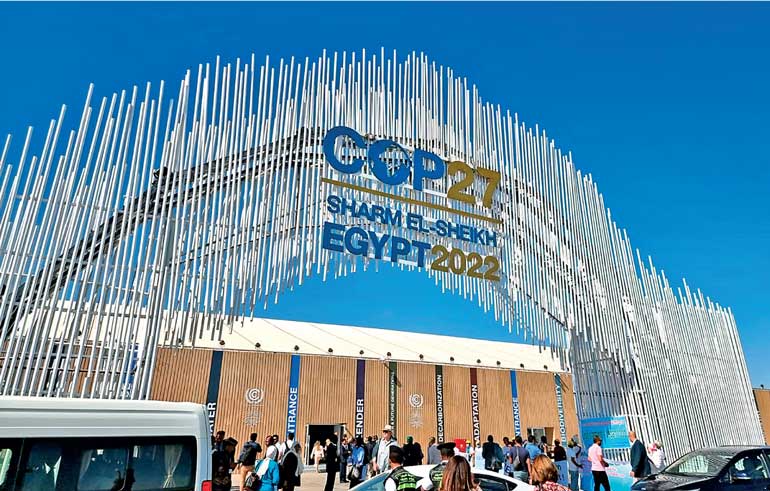Thursday Feb 19, 2026
Thursday Feb 19, 2026
Saturday, 12 November 2022 00:10 - - {{hitsCtrl.values.hits}}

COP27 is currently bringing together tens of thousands of country delegates and observers in Sharm El Sheikh, Egypt, to discuss the future of climate action
 COP27 is currently taking place in Sharm El Sheikh, Egypt. This global climate conference, by far the largest and most important climate-related event of the year, started on 6 November and will last until 18 November, with tens of thousands of delegates and observers joining discussions across the enormous venue. Convened by the United Nations Framework Convention on Climate Change (UNFCCC), it brings together parties to the UNFCCC and the Paris Agreement as well as non-party actors working on climate change, allowing them to engage in global negotiations, knowledge sharing, networking, and collaborations.
COP27 is currently taking place in Sharm El Sheikh, Egypt. This global climate conference, by far the largest and most important climate-related event of the year, started on 6 November and will last until 18 November, with tens of thousands of delegates and observers joining discussions across the enormous venue. Convened by the United Nations Framework Convention on Climate Change (UNFCCC), it brings together parties to the UNFCCC and the Paris Agreement as well as non-party actors working on climate change, allowing them to engage in global negotiations, knowledge sharing, networking, and collaborations.
The conference is set against a backdrop of increasingly severe climate impacts around the world, from floods to droughts and heatwaves to wildfires. No country is exempt from climate change, but the exact scale and nature of impacts varies significantly, as do available resources and capacities to address these impacts. Therefore, one of the key tasks of COP27 is enhancing support for vulnerable developing countries and enabling them to engage in more effective, efficient, and comprehensive action on climate change mitigation, adaptation, risk management, and loss and damage.
The urgency of climate negotiations
A new analysis by the Independent High-Level Expert Group on Climate Finance estimates the staggering cost of climate change. “Emerging markets and developing countries (other than China) will need to spend around USD 1 trillion per year by 2025 (4.1% of GDP) and around USD 2.4 trillion per year by 2030 (6.5% of GDP),” the report states, with money needed for transforming key economic sectors and addressing climate risks, vulnerabilities, and losses and damages. As per the report, the energy sector, the agriculture sector, ecosystem restoration, and risk management are priority areas for climate action that will require major resources and investment.
The report stresses that “timing is crucial; delay is dangerous,” a fact that hangs over COP27 and permeates its vast halls and corridors. The time window for keeping global temperature rise below 1.5 degrees Celsius above pre-industrial levels is rapidly closing, and without decisive action, vulnerable developing countries like Sri Lanka will bear the brunt of climate impacts. Already, droughts, floods, storms, and a multitude of other events and long-term processes affect lives, livelihoods, assets, ecosystems, and human wellbeing.
For this reason, developing countries have long called for more finance from developed countries, particularly for addressing the impacts of climate change that already affect them (loss and damage) as well as for preventing further impacts and allowing them to thrive in a changing climate (adaptation). In addition to curbing greenhouse gas emissions and the resulting global temperature rise, adaptation and loss and damage are included as central elements in the Paris Agreement and subject to the party-driven negotiation process.
These climate negotiations lie at the heart of COP27 and see representatives from almost 200 countries gather in Egypt to discuss the future of climate action under the UNFCCC and the Paris Agreement. As parties to the agreement, countries have committed to reducing greenhouse gas emissions and adapting to climate change based on their national capacities, resources, and responsibilities. However, the exact details and modalities of their contributions—based on the principle of “common but differentiated responsibilities”—must be determined through a complex intergovernmental process.
In this space, finance is being discussed through different workstreams, including on a new collective quantified goal on climate finance for the years beyond 2025, as well as on finance for addressing climate-induced losses and damages, which has been included as an agenda item for the first time. However, while this indicates progress, there remains a long way to go towards the establishment of a finance facility for loss and damage under the UNFCCC. In the meantime, some developed countries have begun to explore ways of providing loss and damage finance outside the negotiation process, including through initiatives such as the Global Shield against Climate Risks.
COP27 outside the negotiations
While the negotiations are the key reason for COP27 to happen, they are far from the only thing currently taking place in Sharm El Sheikh. Across three halls, dozens of pavilions host hundreds of daily side events to exchange knowledge and discuss issues related to climate change, sustainable development, ecosystem conservation, food systems, human mobility, just transition, youth engagement, gender, vulnerable communities, risk management, and many more. These pavilions are hosted by countries or country associations (such as the Francophonie or the Climate Vulnerable Forum/V20 nations), but also by observer organisations and civil society to contribute evidence and inputs into the negotiation process.
In addition, there are two separate venues focusing on civil society (the Green Zone) and business and innovation (the Climate Innovation Zone), as well as side events happening in rooms across the main venue (Blue Zone). Furthermore, the first two days of the conference were taken up by the World Leaders Summit, which saw more than a hundred heads of state—including Sri Lanka President Ranil Wickremesinghe—engage in high-level discussions and announcements of climate action.
As the first week of COP27 comes to an end, the world is watching Sharm El Sheikh for ambitious outcomes that will accelerate and enhance climate action around the world: on mitigation, on adaptation, and on addressing loss and damage to protect those who are most exposed and vulnerable, especially in developing countries.
(The writer works as Director – Research and Knowledge Management at SLYCAN Trust, a non-profit think tank based in Sri Lanka. His work focuses on climate change, adaptation, resilience, ecosystem conservation, just transition, human mobility, and a range of related issues. He holds a Master’s degree in Education from the University of Cologne, Germany and is a regular writer to several international and local media outlets.)